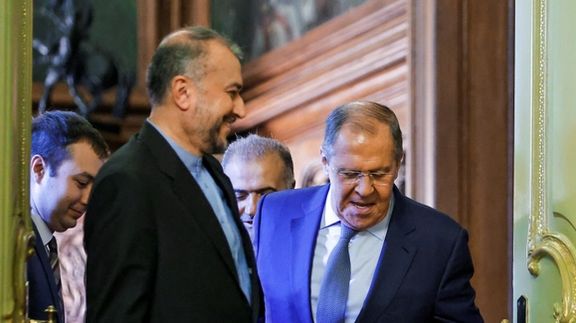UN Agency Still Central To Iran Nuclear Deal Prospects

Iran’s foreign minister has said that reviving the 2015 nuclear deal requires “stronger guarantees” from Washington and ending “politically motivated probes.”

Iran’s foreign minister has said that reviving the 2015 nuclear deal requires “stronger guarantees” from Washington and ending “politically motivated probes.”
Hossein Amir-Abdollahian told a press conference in Moscow Wednesday that while Iran was “carefully reviewing” a text circulated by the European Union August 8, a “sustainable deal” needed “stronger guarantees from the other party.”
Reports following the United States August 24 input on the EU text suggest Washington and Tehran are far closer in efforts to restore the 2015 agreement, the JCPOA (Joint Comprehensive Plan of Action). A former senior official in the International Atomic Energy Agency (IAEA) told Iran International Tuesday that two to three weeks were needed.
In line with that timetable, the IAEA governing board is due to meet September 12-16. The meeting comes three months after the 35-member body passed a resolution – moved by the US and three European states – censuring Iran over its failure to satisfy the agency over uranium traces found by inspectors in three sites undeclared as nuclear-related.
Amir-Abdollahian: ‘Close this case’
Reiterating recent statements by President Ebrahim Raisi and Mohammad Eslami, head of the Atomic Energy Agency of Iran, Amir-Abdollahian said the agency should “close this case” as “such politically motivated demands are unacceptable.” The agency, the foreign minister said, should “focus only on its technical task.”
This contradicts claims made by a US official to Reuters August 23 that Iran had dropped such a demand – although it has also been suggested that Tehran and Washington might find a way to kick the issue into the long grass.
Iran argues that after the IAEA published in 2015 a final assessment of Iran’s nuclear work before 2003, it then resumed enquiries after allegations made in 2018 by Israeli prime minister Benjamin Netanyahu supposedly based on documents stolen in Iran. The US argues, regardless of the JCPOA, that Iran should explain the uranium traces under its basic ‘safeguards’ commitments as a signatory of the Nuclear Non-Proliferation Treaty.
Congressional hurdle?
Aside from the IAEA board meeting September 12-15, the Biden administration’s efforts to renew the JCPOA may be affected by Congressional elections due November 8. A recent poll for CBS found that Republican gains may be less than earlier projected, but US politics remains volatile given a range of issues including abortion, gasoline prices, and the polarizing role of former president Donald Trump.
While Iran is hardly uppermost in voters’ mind, the nuclear deal interests many representatives. A letter circulating since Sunday, expressing concerns over renewing the JCPOA and opposing any easing of sanctions, had attracted over 40 signatures of members of the House of Representatives by early Wednesday, including 30 Democrats.
According to outlines of a possible agreement to revive the JCPOA reported by the Jerusalem Post, Biden would lift many US sanctions five days in advance of a review by Congress that is required under the Iran Nuclear Agreement Act passed 2015. Should the two houses of Congress reject the deal, Biden could still override their wishes.
Various reports on the emerging agreement over JCPOA revival refer to a number of phases lasting 165 days. This could allow either the US or Iran to back away if they felt the other side was not taking their agreed steps – with the IAEA probe possibly caught up in the process.